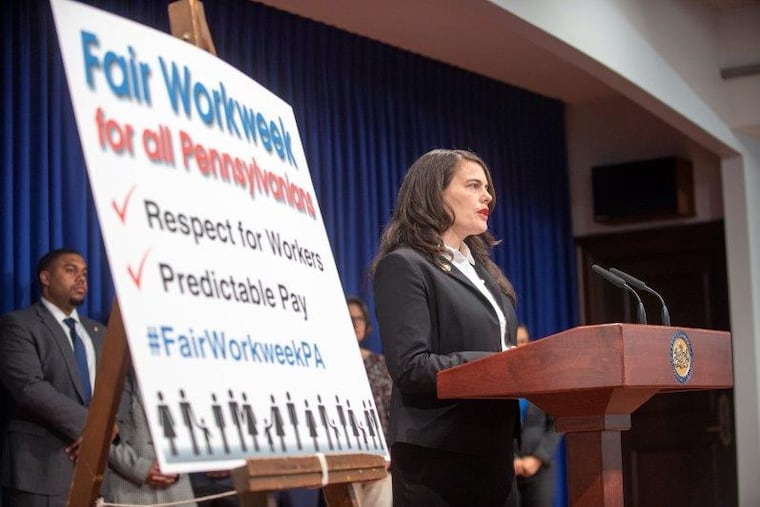All Pennsylvanians deserve a fair workweek | Opinion
This is Pennsylvania’s chance to be a national leader and stand up for workers.

Imagine counting on your paycheck to cover groceries, child care, and rent. Suddenly, your work shifts are canceled, and your take-home pay is much less than you expected. Imagine your boss calls you in to work at the last minute, and you can’t find someone to take care of your infant daughter. Or, imagine you’re battling cancer and you can’t get to your regular treatment because you’re called in to a last-minute shift.
Tens of thousands of Pennsylvanians don’t have to imagine this kind of instability. They live it. Maybe you live it, too.
That’s why we’re supporting Fair Workweek legislation in Pennsylvania. Last week, labor leaders stood together in the state Capitol to announce Rep. Fiedler’s introduction of the legislation, surrounded by lawmakers from across the state.
Our statewide legislation is similar to the Philadelphia legislation that was signed into law last year. It establishes workplace protections that require large hospitality, retail, and food service companies to give employees their schedules two weeks in advance. If changes are made to that schedule after it has been posted, extra compensation would be paid to the worker losing or fulfilling a shift at the last minute. Exceptions are made some in cases, like when employees choose to change their own schedule, or a business closes due to a weather emergency.
It’s a simple protection that would have a significant positive impact on people’s daily lives. It would allow workers at large companies like Target, Home Depot, Applebee’s, and Marriott to schedule doctor’s appointments, community college classes, and child care without the uncertainty of inconsistent scheduling. They could set a more stable household budget, confident they won’t lose vital pay at the last minute. What’s more, workers could see physical improvements, as the risks of fatigue, cardiovascular disease, and other health problems decrease when people have predictable schedules and guaranteed rest time between shifts. In short, people could be free to work and to live their lives as members of their family and community.
The fight for workers’ health and survival is not new.
Unionized hospitality workers have fought for decades for protections in their contracts around scheduling, but it’s still challenging to work in what is increasingly becoming an on-call industry. Hotel owners want workers to bear more of the volatility of their business. Nonunion hospitality workers have it even worse. They can be subject to wildly unpredictable schedules, and they don’t have a voice on the job to fight back. Many food service and retail workers find themselves in the same position.
And yet, we know that the measures called for in this legislation can be followed without ruining a company’s business model — tens of thousands of employees have predictable scheduling because they have union representation and protections through a collective bargaining agreement. But these protections shouldn’t just be reserved for workers fortunate enough to have a union. Instead of being the exception, fair scheduling should be the rule.
We are grateful for the strong foundation that has already been built by Philadelphia’s powerful coalition of workers, community groups, labor unions, and businesses brought together by Councilwoman Helen Gym and others. A half-dozen other cities, including New York and Seattle, as well as the state of Oregon, already have Fair Workweeks. This is Pennsylvania’s chance to be a national leader and stand up for workers.
There is a structural imbalance of power in our state and our country right now. Some corporations and the richest 1 percent are trying to squeeze more and more out of workers — seeing them only as an employee number, not as human beings. This is predatory and immoral. Our push for Fair Workweek legislation is part of a much larger struggle: for a minimum wage increase and one fair wage, for progressive taxation, for environmental regulations that protect the air we breathe and the water we drink, for schools that are fully and fairly funded.
When workers unite, we are unstoppable.
Elizabeth Fiedler serves as state representative for South Philadelphia’s 184th District. Rick Bloomingdale is president of the Pennsylvania AFL-CIO, and Rosslyn Wuchinich is president of Unite Here Local 274. Wendell Young, president of United Food and Commercial Workers 1776 Keystone State, also contributed to this article.